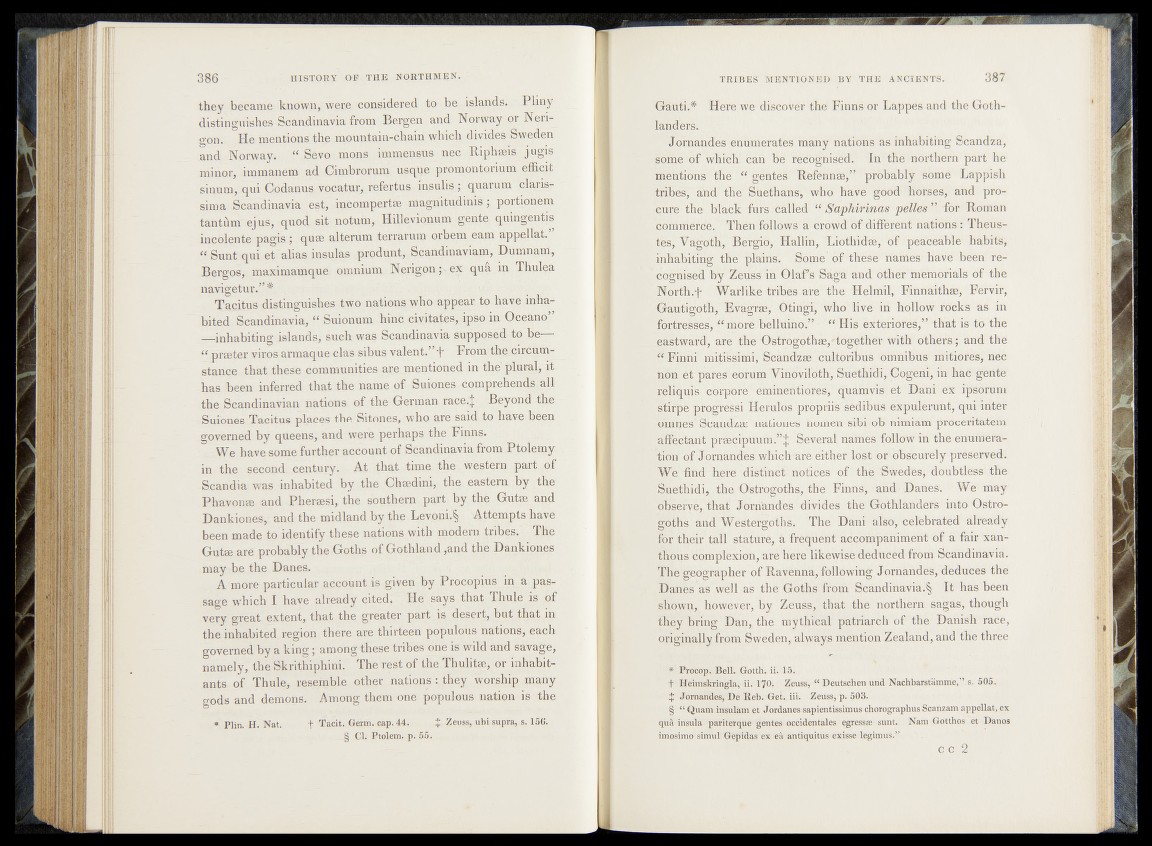
they became known,were considered is la n d |p Pljgy
distinguishes Scandinavia from Bergen and Norway.;or^ Neri^
gon. He mentions the mountain-chain which dm d ^ f SwodeiV'!
and Norway.&g^evo - mons immengus^ R i^ h a ^ j-ugis
^pmnrj_ immanem ad Cimbrorun\ usque proi^o|^orium^6||;cit
sinum, qui Codanus,. voc atur, refertus insulis ; quarum Claris?
sima Scandinavia es$, mcompertfe magnitudifiis; portioriem
tan tdm eju s, qupd ^if .notum, Hillevionum gente quingentif
incolente pagis; quse alteram terrarupa orbem earn appellat.
“ Sunfcqai et aUas insulas .produnt, Seandinaviam, Dumnarn,
Bergos, maximamquei omniui^ Ner^gon^ex qu|.,;in Thpl^a
navigeturi’*
Tacitus distinguishes two nations who appear to have-inhabited
Scandinavia, “ Suionum hincmyitates,qpso in Oeegnq/
—inhabiting islands* such wa§ Scandinavia sujyfesje^o^be—
“ piaiter vifps armaque clas sibus
stance that these communities are mentioned in the plural, iff
has been inferred that the name of Suionesrpompieliends alp.*
the Scandinavian nations of'the German race.| Beyond thj|*
Suiones Tacitus places the Sito.nes, who are said to have been
governed by queens, and were perhaps the Finns.
3 We have some further account of Scandinavia from Ptofemy
in the secopd^ century. AT that time the western part.^g
Scandia was inhabited by the Chsedinij^the^pastem by the'.
Phavonm and Phermsi, the southern part by the Gutae and
Dankioues, and the midland by the Levpni.% Attempts have
been made to. identify these nations with modern ^ribes.' The
Gut® are probably the Goths of Gothland ,and tjhp Dankionps
may-be the Danes.
A more particular account is gwen by Procopius ip a passage
which I have already cited. He" says that Thule is of
very great' extent, that the greater part is desert, but that in
the inhabited region there are thirteen populous nations, each
governed by a k in g ; among these tribes one is wild and savage,
namely, the Skrithiphini. The rest of the Thulitae, or inhabitants
of Thule, resemble other nations: they worship many
gods and demons. Among them one populous nation is the
* Plin. H. Nat. f Tatit. Germ. cap. 44. $ Zeuss, ubi supra, s. 156.
_§ Cl. Ptolem. p. 55.
Gauti:^ HerdHveM.^êq%i1 thd FinnS'or Lappes and the Goth-
fan'dei,|'. '
Jomand^s,dmlnddm'lJo^mhhy,na'fi’0$^Kinhabiting Scandza,
Hm e lof A M MSjM} ilne recognised. northern part he
mêLitib’n'3' ' tfic" *' p'ràbablÿ “sqmè Lappish
frclfôsd'SM tltë^^5li™Ef®ïs^: b ho h aVâ^go'od ‘ and prol
l i the** b l à / ^:'pelfésl Hftbr Roman
æprMlétcîè/ Thchi follôu^s^cipwd ôf’différent hâttSrid : Theus-
Beï:g®, 'Dbïfini,(^lOTh^qæ/ of rpeahé'aîwle habits,
inhabiting tfîc plains, ypohie1 offtlï^§^bame’S‘;'“ 2weTbeeûr re-
m ^ g n ^ a wy^euss in^Gla^éf^^^^ènd^oîtHdi^melkl^paÈls^bf the
Nortfe-jf Warlike ^ïbes!^è.r the ITefrmï, FMnaithæ,1 Fervir,
Gantraoffi Ev^grse/“©tîi^il^who li-yë^in !as in
pM^esses,’*“ môre belluino.” - (f His th a t® tb 'th é
eastward, are th^^%|fog|ljïæ,^dg^®^^withr others ; and the
If^Fihm nil^îs^tn%’% eàn^^^lt6V ibus 'offinipts^ 'nÉjjt|Ô^dsÿnec
non etqmfés?écffum Vl^pTOthÿWe^-M^Ift^^lîi, ir^hac^^Élé
reîfq^K'côrpbre emittéMiorep)1 quamvilfet' D a n te x ipsôrum
Wtif pé pro’gWssi HeMlo|^propfi$ffé4ibud éxptileftfnt, ijufdntfer
ômb^^sî|a^<Ëæ natidnes’ feomèn^ïmfib nimiam 'pfcîeé^lthtem
affectant p r^ ^ u u n i.^ ^ \S ^ e i^ , ndMé'^ follow in the enumerà-
tïdh' ôf Jornandes whiç^aM,êfÉher losibtfHbscure]y preserved;
We find herd -èîsiThc^aôtioes” ,©f \ thhiîSWédfesj 'ff6ubtless,the
^ùethidi, tbe|'G^pà’oths, the“? Finns, - and ' DarieSt'-*' W e may
observe, that J or nandhlf d i vi d th e^'Gbt'hîân ders into Ostrogoths.'
dnd Westdigoths." The DahifjdW,''cîBbbratëd already
for their tall stature, a fréqnéûlfa|c]b^)âhiment of a fair- xanthous
'completion, are here‘lik€^v|se ded%bed from Scandinavia.
Thè geographer'of Ravehnà/foïlo.wihg Toré|fhdhs, deduces the
Danes as well5as the Goths IVorh-Scandihavia.MIt has been
shown, however, by Zéuàs, that the northern sagas, though
they bring Dan, the mytulèâ-l' patriarch bf^ the Danish race,
originally from Sweden,, always mention Zealand, and the three
** Procop. Bell. Gotth. ii. 15.
f Heimskringla, Ü.-T-70. iÇeuss, c< Deutschen und Nachbarstamme,” .s. 505.
- Jornandes, De Reb. Get; iik Zeus^, p. 503.
l' g “ Quam insulam et Jordanes-sapientissimus chorographus Scanzam appellat, ex
quâ insula' pariteïqjie geûtes occidentales egressæ «unt.. Nam Gotthos et Danos
imosimo siiriul Gepidas ex eà antiquitus exisse l^imus.”
c c 2